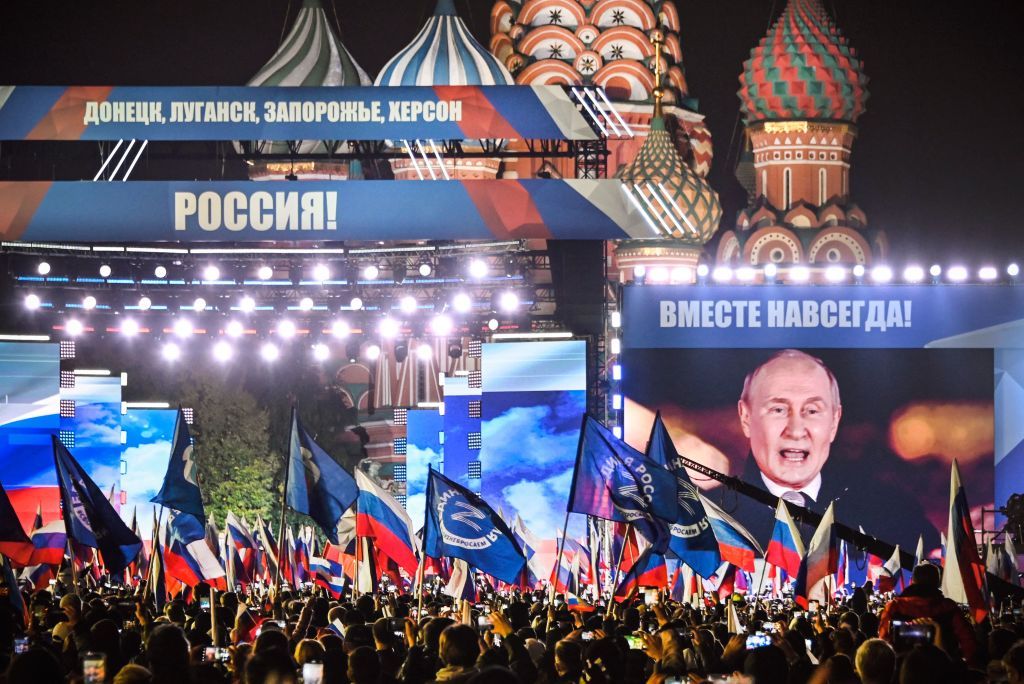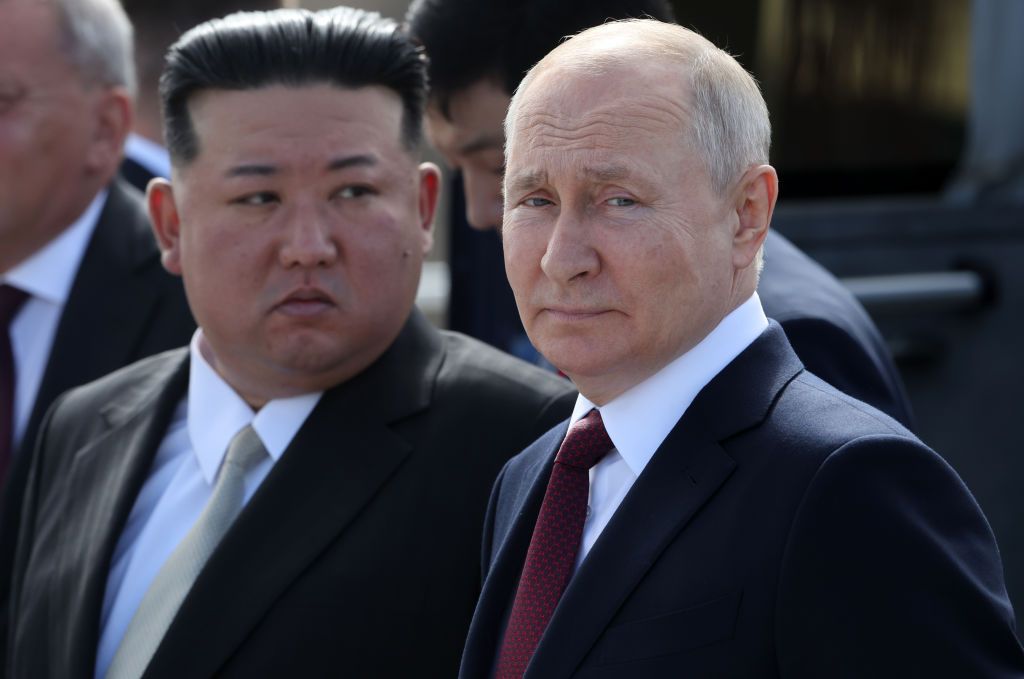How Russia’s liberal tech companies became the foundation of Putin’s war effort

Fridays at Russian tech giant Yandex — the company once christened as "Russia's Google" — are marked by a large-scale all-hands meeting where employees can bring questions and problems to the company's upper management.
Called khural, among the company's employees, a name for Mongolian parliament, the values behind it are usually associated with Silicon Valley.
When Yandex's founders created the weekly ritual, they wanted to foster a sense of transparency, democracy, and community not found in other Russian companies.
Today, staffers can either join the khural in person or watch on live stream from across the world. Yet, while the meeting has remained a place for heated discussion, the exchange of views is not as frank as it once was.
"There is growing complicity through self-censorship," says Olga Solovyeva, a researcher at the U.K.'s Open University.
She has spent months studying the shift in Yandex's leadership from liberal and pro-democracy to increasingly apolitical as a case study for Russia's wider tech scene.
"Top management are censoring themselves, and employees are censoring themselves to avoid a potential clash of the views," she says.
While Yandex staff still discusses Russia's brutal war against Ukraine or the Kremlin's request for data handovers, many are more guarded than they were.
Once, the company was known to be overwhelmingly pro-opposition. That is no longer the case.
The most open discussion has now moved from the company-wide meetings to the anonymous message board Yandex still hosts on the company's intranet.
"This is where proper collision is happening," says Solovyeva.
"In the context where your rights are taken away from you, where you don't feel safe saying certain things in case it's going to be reported further, it's the last isle of freedom in the place of fear and self-censorship."
In the late 2000s and early 2010s, Yandex had been hailed by outsiders and domestic pundits alike as part of a new wave of Russian tech startups.
Many hoped that these liberal, Western-facing companies would become a disruptive and modernizing force not just inside Russia's economy but across society as a whole: a much-needed pushback against the creeping state oppression that began to take hold after the 2011 large-scale opposition protests.
But that dream never came to fruition.
A decade later, Russia's tech behemoths are no longer the country's great liberalizing hope but an integral part of the Putin regime: censoring information, suppressing dissent, and giving security services the data they need to track opposition figures.
Their story has become a global example of how even supposedly liberal private tech companies can be co-opted by governments to achieve repressive state goals.
The chilling effect
Tech companies are an obvious choice for state repression and control. They can be used to monitor and control large swathes of the population with little investment from the government itself.
While states can (and do) build their own surveillance or influence campaigns, these are usually expensive and time-consuming.
The facial recognition system used inside the Moscow metro, for example, which was linked by rights group OVD-Info to the detention of at least 67 activists and journalists on Russia Day 2022, has cost the Kremlin millions of dollars to build and maintain.
In 2021, Russian news outlet Kommersant reported that the Russian government had earmarked some $12.5 million for the network's latest expansion. That price tag would be far more expensive today, with a bevy of international sanctions hampering Moscow's ability to procure items such as microchips.
Yet, despite demanding large amounts of funds, such government-led measures are also not necessarily effective.
In a report released in September 2022, Meta said it had removed a network of 703 Facebook Pages and 29 Instagram accounts believed to be part of a Russian state campaign.
Despite painstakingly recreating fake versions of 60 legitimate websites, including Spiegel, The Guardian, and Bild, and operating in English, French, German, Italian, Spanish, Russian, and Ukrainian, the network was only able to gather approximately 4,000 follower accounts on Facebook, and 1,500 on Instagram.
The use of private tech services neatly sidesteps all of these problems.
Most are already embedded in daily life: Some 78 percent of Russians use Yandex services each month, while social media site VK boasts almost 80 million active users in Russia each month.
By harnessing these existing digital spaces, the Russian government can access a ready-made audience with relatively little expenditure or effort, says Marie Lamensch, a researcher specializing in human rights and digital authoritarianism at the Montreal Institute for Genocide and Human Rights Studies.
"Russia has a lot less resources (than countries such as China). It tends to be more low-tech, but it can be just as efficient. Russia has always been very focused on communications rather than really deploying this big high-tech arsenal such as cameras and drones that it can't really afford," says Lamensch.
"Russia is putting a lot of its money into the war: the Russian economy is not doing great. It would need to manufacture these tools, and where is it going to get them? But Russia has always been, even during the Cold War, very good at disinformation."
But Russian tech companies aren't just used to spread propaganda — they are also used to crack down on dissent.
In 2022, 779 people in Russia faced criminal charges over online comments and posts, according to non-profit Net Freedoms. Often these are followed by fines, but can occasionally end up with jail terms.
This number of cases may seem relatively small, given Russia's size. But, Lamensch says, their main purpose is to create a chilling effect. The omnipresent nature of the digital world is well-positioned to build an atmosphere of suspicion and paranoia.
"You're not sure whether you're being followed (by the security services) on social media or who has access to what. There are different types of spyware that can access your phone and your contacts. You're not safe at home. You might put your own friends at risk. It's the feeling of threat that's part of the authoritarian playbook," she says.
Endless compromise
However, the question remains: if Russia's tech companies knew that they had such power — and undoubtedly, they did — why did they give it away so easily?
In some cases, founders have been forced out during business takeovers in favor of Kremlin-friendly replacements, such as Pavel Durov, who said he had been fired from the social network company he created, VK, in 2014.
"The freedom of action of the chief executive in managing the company has considerably decreased. It has been harder and harder to remain with those principles on which our social network is based," Durov, who would go on to create Telegram, wrote in a statement at the time.
For tech firms such as Yandex, however, which remains more formally outside state control, the picture grows murkier.
Their journey from loudly pro-democracy to enabling Kremlin oppression was gradual.
Many pinpoint 2011 as a key year: When the Russian government started to take an interest in Yandex's news aggregator following large-scale opposition protests.
Increasing legal pressure was used as an ongoing tool to ensure that companies fell in line.
Human rights group Agora found that 97 laws and regulations passed by the Russian government in 2016 directly affected the ability of news organizations to operate online, compared with just five in 2011.
They included the so-called "Yarovaya law," which required digital platforms to collect and store more information on their users, while law enforcement agencies were given mandatory backdoors to encrypted messages.

Although Yandex's main international holding remains based in the Netherlands, the majority of its income and operation is based firmly in Russia itself. If it wanted to remain in the Russian market, the company had to follow these laws.
But there was also unofficial pressure, and Yandex's upper management was increasingly turning to compromise in a bid to appease the state.
These negotiations were carried out exclusively by top-level staff and were seen by many as a way for Yandex to try and protect their employees, says Solovyeva.
Successive Yandex leaders were more open to accepting certain Kremlin demands.
Yandex co-founder Ilya Segalovich famously came into the Yandex offices wearing a white pro-opposition ribbon in 2011. But Segalovich died of cancer in 2013, and those who came after him did not have the same strength of political belief.
Successive Yandex managers and directors believed they could bargain with the Kremlin. But ultimately, no amount of compromise was ever enough.
"It's what happens when you face a bully. From one compromise, you get another compromise because the bully always wants more and more from you. This is the pattern of relationships with authoritarian regimes in general," says Solovyeva.
This scenario, however, did cause wider mindsets within Yandex to shift.
Top leaders increasingly tried to present themselves as apolitical — a stance designed to neither offend the Kremlin nor the young Russian urbanites that made up much of its staff and customer base.
This had a chilling effect of its own.
"When we see the company's leadership going to meetings like the khural and taking this 'apolitical' stance, not saying things or using euphemisms, that triggers a lot of change in the organization," Solovyeva says.
"It sets an example for managers who will go back and behave in the same way with their teams. It sets a pattern, and people start to fall into this groupthink phenomenon."
As Yandex grew throughout the mid-2010s, it also began to move into other areas, such as taxi, courier, and food delivery services. But while this expansion may have taken Yandex away from more politically sensitive areas such as new aggregation, it brought its own set of problems.
It made Yandex far more visible on the streets of large cities such as Moscow, highlighting its growing importance even to Russia's older, technophobic officials. (In 2020, the Kremlin confirmed that Vladimir Putin himself did not have a smartphone, although "he does use the internet from time to time.”)
But it also made the company's workforce far larger and far more diverse. Hiring became more of a formal process, rather than relying on personal networks of like-minded people. Even now, between 40 and 80 new starters join Yandex each week.
"People who work in digital — let's say that they can be a bit dreamy. But people working with taxi drivers, delivery people, couriers, warehouse managers, logistical operators they have a very different set of skills. It's hard work, they need to be more strategic," says Solovyeva.
This sector required a huge amount of investment in terms of land and other assets, which put Yandex in far more direct contact with local officials and administrators. Those closer ties also meant more compromise.
"It's a corrupt country, after all," Solovyeva says.
By the time that Russia's "fake news" laws were introduced in 2022 — legislation that effectively bans Russians from accurately calling the full-scale invasion of Ukraine "a war" — Yandex employees were already less likely to hold pro-opposition views, and if they did, they were less likely to express them in the workplace.
"You physically can't maintain a workplace of 40,000 people who have the same political values. Some people working in Yandex don't share an anti-authoritarian agenda, but you still have to work with them," Solovyeva says.
A data-driven dictatorship
By the time Moscow launched a full-scale invasion of Ukraine in February 2022, the impossibility of Russian tech firms' "apolitical stance" had become increasingly apparent.
By March 2022, Yandex was censoring its news feed more strictly than ever before in line with the Kremlin's "fake news" legislation.
The move prompted scandal, and the company sold both the news aggregation service and its homepage to VK in an apparent attempt to shed this politically sensitive area of its business.
Yet ultimately, avoiding areas such as communications and social media has not helped Russian tech firms avoid political compromise.
Yandex has still been found to censor its general and image search results and is involved in training the A.I. destined to be used in mass surveillance.
Other legislation passed in September gives Russian security services the power to access data from the country's digital taxi services, information that could be used to track citizens' movements.
Digital authoritarianism in Russia doesn't just encompass social media platforms, but Russia's entire tech ecosystem — and by default, all of the companies that operate within it.
Ultimately, there is very little within Russia's digital space that can currently remain outside of state control, says Fabian Burkhardt, a research associate at the Leibniz Institute for East and Southeast European Studies. He describes the system as data-driven authoritarianism.
"It's said that data is the new oil. If you manage to datafy your state and economy, you can harvest that data. On one hand, that creates a lot of additional revenue, but it also creates additional means for controlling and surveilling your population," he says.
Russia's e-government service, Gosuslugi, is a prime example of this.
The platform allows users to organize medical appointments, register their children in kindergarten, pay fines, or apply for state benefits. Like similar e-government systems accross the world, these platforms are deeply embedded in daily life and can collect large amounts of personal data.
The real question, however, is how such platforms are used.
In April 2023, the Russian parliament passed legislation that allowed conscription summons to be issued via the Gosuslugi portal rather than in person in a bid to force more men to fight in the country's war against Ukraine.
The use of VPN services — digital tools that encrypt your internet connection to hide your location — has risen significantly in Russia since the start of the full-scale war, suggesting that Russians are increasingly aware of the risks that come with using the internet, says Burkhardt.
But platforms like Gosuslugi are so tightly woven with daily life that when the digital summons law was announced, there was no overwhelming rush for Russian citizens to delete their accounts, he says.
"Often you only have the choice to stay on this platform and try to navigate around (these issues), but you cannot completely opt out of it because it's so omnipresent," he says.
Protection and isolation
In this all-encompassing environment, tech companies have two choices: Remain in Russia and comply with oppressive Kremlin demands, or leave the country and struggle to survive on a more competitive global stage.
Most have decided to continue, although many of the company's staff members have left Russia for neighboring countries — a decision in many cases enabled and supported by their employers.
This duty of care towards staff members is perhaps one of the few remaining similarities that exists between liberal Russian tech firms and the Silicon Valley companies that they once wanted to resemble.
Yandex employees in Russia, for example, travel between state-of-the-art offices, complete with their libraries, music rooms and gyms, and comfortable homes, paid for by their generous salaries.
Staff can access private healthcare, rather than waiting in line at the state clinic, or even apply for loans from the company rather than approach an outside bank.
And while there are widespread reports of individuals in companies such as Yandex who repeatedly rebel against Kremlin diktats — delaying or refusing data requests or pushing for the publication of transparency reports — this comfortable bubble isolates Russia's tech elite from the consequences of their actions.
Largely excluded from mobilization — either due to government dispensation or the ability to pay for falsified medical exemption — they are unlikely to ever see Russian aggression on the Ukrainian front line.
"Their world is very different from the world of the average Russian citizen. You have this physical environment and this political environment that is becoming more and more sterilized," says Solovyeva.
"This is how these compromises become normalized. You want to protect your way of life; you think you deserve it. You see your leadership making these compromises because they 'want to save the company.' It becomes normal, and there's no room for any other course of action to emerge because discussion is censored," she adds.
"Ultimately, you censor yourself."















